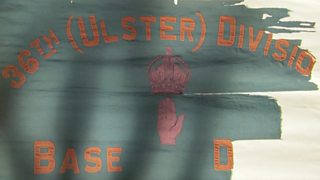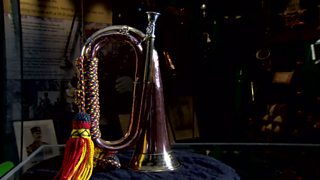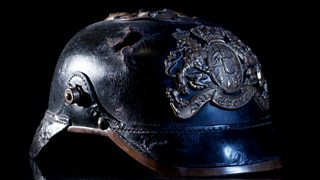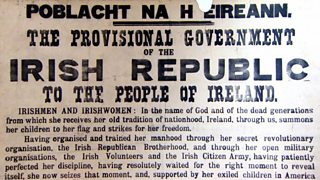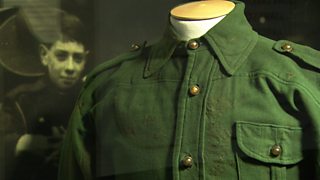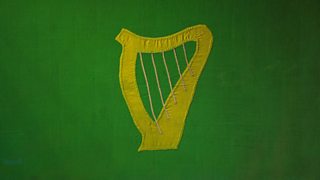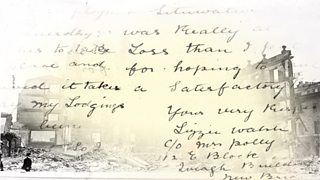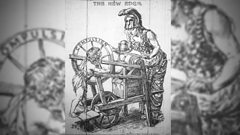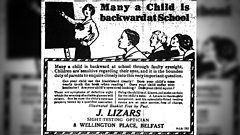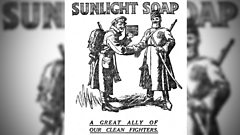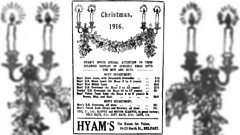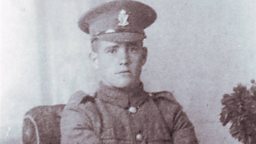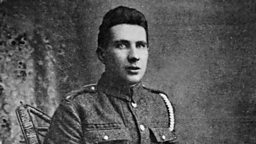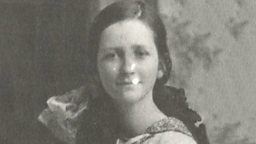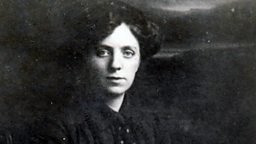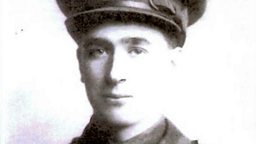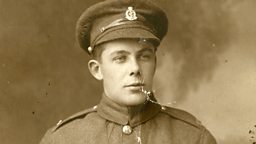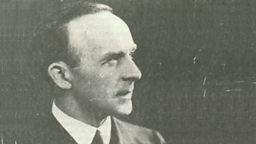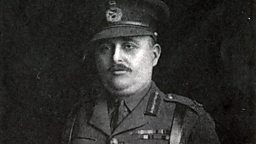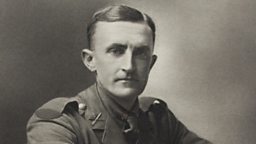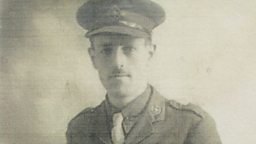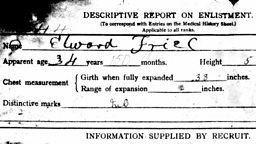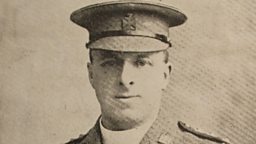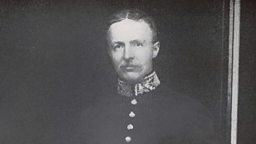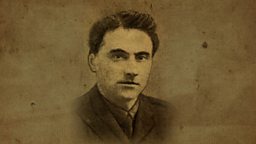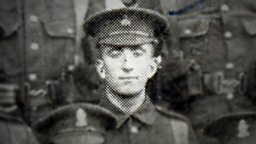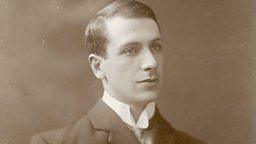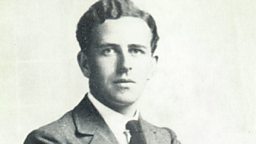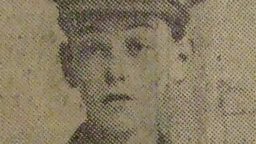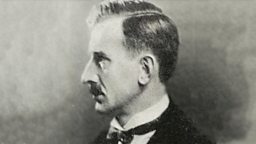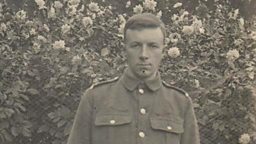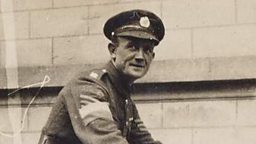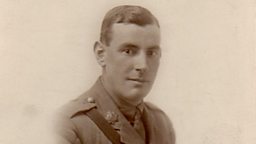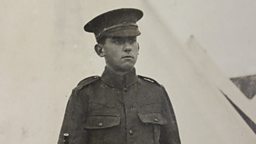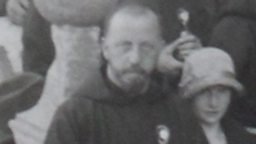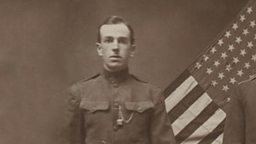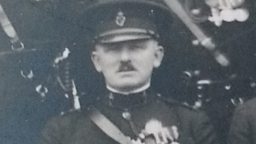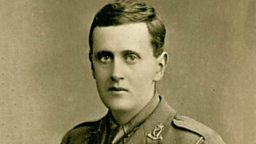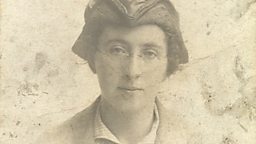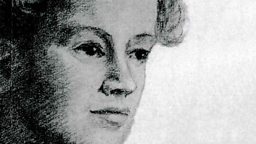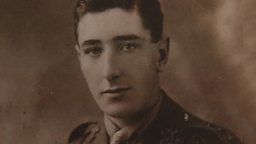David Starrett
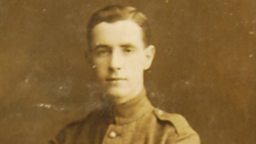
Batman to Lt Col FP Crozier
David Starrett was born in Belfast in 1897. His father was a riveter and David spent his early childhood in the Tiger's Bay area.
Masses of dead and dying instead of ranks moving steadily forward
According to his memoir he worked for "five years in the milk trade." Horses played a key role in this profession and David would have learnt how to handle them – a skill that would later change the course of his life.
When in his teens, David was caught up in the Βι¶ΉΤΌΕΔ Rule Crisis. He opposed Βι¶ΉΤΌΕΔ Rule for Ireland and signed the Ulster Covenant in September 1912. By 1914 he was an active member of the West Belfast UVF: "Yes, the lads of Ulster in 1914 were ready to fight. We were the Ulster Volunteer Force of Carson's Army ... But little did we think we were drilling to fight not our own countrymen but the Germans."
On the outbreak of war David was eager to enlist: "Down I went with the boys, to stand outside all day long." He was still only 16 years old but, keen for adventure, he claimed to be 19: "'Age?' 'Nineteen years, Sir.' My! I had the face of brass. And it worked."
"So inside half an hour I was a soldier."
Starrett would go on to serve as batman to officer Frank Percy Crozier, initially with the 9th Royal Irish Rifles, 36th (Ulster) Division, including at the first day of the Battle of the Somme. Later, as Crozier was promoted, Starrett accompanied him, transferring to 119th Brigade (40th Division), and serving through to his own demobilisation in 1919. After the war, Starrett wrote a detailed, unpublished memoir of his experiences, simply entitled 'Batman'.
Batman
At training camp, Starrett records an eventful day early on when he met "a heavily built small gent. Someone of importance, he looked ..." It was Frank Percy Crozier, gazetted a Major, Second in Command, with the 9th Royal Irish Rifles in September 1914.
Starrett recalled that Crozier wanted his horse collected from the railway station: "'Can you ride a horse?' he asked. Could I ride a horse? Me, who'd done five years at the milk trade! 'Where's the horse?' I said ... I would let the old bloke know if I could ride!"
Crozier, duly impressed, took him on initially as a groom, telling him, "Well, Starrett, you belong to the 9th Bn Royal Irish Rifles from now on." Shortly afterwards, Crozier accepted him as his batman or personal assistant.
Starrett thought him "a decent old bloke" who eventually "broke me in. Though never quite."
Crozier
Crozier and Starrett got off to a shaky start, he says: "I could do nothing right at first." Crozier found Starrett, he records, "Inattentive ... well meaning but loony. And self-opinionated. He never broke me of that. And he'd a bit of the same. So we fought to the end, fought each other, I mean ..."
But to the teenaged Starrett, "he remained from first to last more of a father to me than my officer. And, though I was loth to acknowledge it, the pride of my life."
Learning the ropes
David recalled a busy time with Crozier, "getting his shaving water, cleaning belt and boots, keeping room or tent or dug-out tidy, running his errands ... how I begun my batmanship, and how I ended also."
Then, after further training in Ireland and England, which he describes extensively, Starrett finally found himself on the boat to France: "Silence, pitch darkness, running water ... and we were marching through the dark streets of Boulogne to the camp at the top of the hill."
Trenches
Starrett recalls initial high spirits: "We were off to knock spots off the Germans. Marching through peaceful and lovely fields ..."
Then they reached their first trenches: "I got my first impression of this one bit of the big battlefield. Shell holes in plenty and broken trees and bursts front and back, but I did not feel very much different than when marching in England ... It was a great old war, shouted someone, and I agreed ..."
But then, he says, the "early setting in of severe weather made a batman's job a little difficult, what with clay and mud and lice and blood and the eternal wetness of everything."
The weather eventually turned "putrid. I left my first pair of thigh-boots in the mud, not being able to pull them out, and, socks being scarce, walked about a mile back with naked feet."
And Starrett himself, trying to cross a stretch of country, instead of going through the trenches, found himself under fire: "I hadn't gone far over that open stretch, however, before it seemed Jerry could see me and had me taped to an inch. Ping, plop, crash, came everything he could spare, and too near for my liking, one burst covering me with more mud than I wanted to carry about. I ran, I fell, I crawled, I lost my way, I went daft, and after running in circles for what seemed hours I fell into a trench nearly into Bob's arms, who later retrieved my stuff. The trenches for me after that, all the time, no matter what I might say as I wearily traipsed through them."
Over time, he says, "The weeks followed each other, the graveyard ... gained many Belfast names, newcomers filled the gaps in the companies, officers changed, we were in and out of the line ..."
Promotion
Crozier still with the 9th Royal Irish Rifles, was gazetted Lieutenant Colonel whilst commanding a Battalion in January 1916. Of the promotion, Starrett says, "his step gave me one." Going to the men, and "Puffing my chest I told them to observe the colonel's batman. That roused them."
Despite everything, Starrett managed occasionally forget his surroundings: "The rats gave us both annoyance and amusement. I liked to lie on my groundsheet and read love-yarns or cowboy stories, when there was time and books. A bit of candle near my head, a book in my hand, and a free hour, made me forget the war – but not the rats that were so active a part of it. Big brutes with bellies trailing the ground would actually nibble the candle close to my head whilst I was trying to read ..."
An execution
Starrett recounts, that "A chap who had been missing some time was picked up by the red-caps near Amiens, and returned under arrest. We'd thought the Germans had him. Then an officer ran from the line under fire and in the sight of his men. The colonel was off the deep end for days about both, and few could get anywhere near him. Both were tried by field general court-martial and the man was shot and the officer got off. That gave me a bit of thought about King's Regulations, but not very clear thought."
"If the officer did not know what he was doing, did the man? We did not think so ..."
Crozier, Starrett says, "was more upset than I'd ever seen him. 'To have to shoot one of your own men', he kept saying. 'A lad who joined voluntarily: had the courage to join up: refused to hide under any excuse to keep out'."
"'But the officer got a free pardon', I said, and the colonel only repeated the words as if he did not quite understand them. And in the snow, just after dawn, our man was filled up with rum before being filled with lead."
That evening (27 February 1916, though undated in the account) Starrett says, "the boys did not play housy-housy or any other games. They sat about silent or loud in argument, steadily lowering the drink. The colonel buried himself in plans and maps of the line."
Rejoining 36th (Ulster) Division
Earlier, Starrett says, the "107th Brigade was attached to the 4th Division"; in Spring 1916, they were once again with the 36th (Ulster) Division, and "though we were glad when the 36th Ulsters relieved the 4th Division we were sorry to see go the men we'd so long fought with and liked. Once more we were in our own brigade, the 107th."
The Somme
Ominous signs
"By the middle of June (1916) we knew the lines from A to Z, and the [sic] 'something fierce' was on the eve of happening. We were getting quite a lot of stretcher cases for the enemy knew we were up to something big. I saw the plans, both of the officers and the small one the non-commissioned officers had, so knew Thiepval was the Ulster objective."
Waiting to attack
On 1 July, David described the men's mood as they "lay waiting for dawn. Not an easy thing to do at the best of times, and hell then, when all nerves were keyed up. For myself, I had a feeling I should come out again."
He continues: "Some of us strolled about, some tried to write hasty notes to their kinfolk. Birds sang. There was a peaceful air in that wood, but a strange peace at that. Rings of men in B Company sat and argued the toss as if in the rest billets, but others sat quiet."
Eventually, "We fell in and moved off, woodbines in mouth, across the Ancre swamp ... At Speyside we massed on the slopes, our guns thundering over us. Then the enemy artillery broke loose."
An inferno of screaming shells
"Crouching, we slowly moved across no man's land. The colonel giving last orders to his company commanders, and I beside him. Bullets cutting up the ground at his feet he watched the advance through his glasses. Then he went off the deep end, and I danced everywhere at his rear. Something had gone wrong. When the fumes lifted we saw what it was – a couple of battalions wiped out. Masses of dead and dying instead of ranks moving steadily forward."
Crozier, says Starrett, set out to reach the men "between the bursts ... his batman making a bad second in the race ... we reached our own men." Crozier, he says, "was signalling the men on. He walked into bursts, he fell into holes, his clothing was torn by bullets ... he again and again rallied his men."
Crozier ordered Starrett to go back to the front line and help bring up ammunition. He obeyed, despite the horror that surrounded him: "Trenches and tops were blocked with the dead, but on days like that there's no sympathy in your heart. Over them you go."
Still, Starrett felt, "Twas hard passing without a word men in terrible pain – men you knew ... The fierce shelling continued ... stretcher-bearers fell every minute."
Senses assailed
"The next day the stench was worse. Our Ninth was holding out, but they were thirsty. A barrage had been put down by Jerry around the springs. It was madness to try and get a drink. Some did, and stayed where they stooped at the spring."
He himself brings ammunition out again, "slowly we made the sunken road, for we were heavily laden, and at last reached Monty and his men, and went back for more. I do not know how many times we went to and fro ..."
On his last journey, "terrific machine gun and rifle fire swept about us. It was by then pitch dark."
Reinforcements arrive
"Then the relief came, and with Bosch helmets and whatnots the boys, what was left of them, got back to a very much shelled Doncaster Camp. Here, for the first time I saw our women workers, nurses and drivers. Working at terrific speed, under fire, but working, and doing their job magnificently. I shall always remember that when I think of the Battle of the Somme."
After the Somme
The lid’s been put back on hell
Starrett's memoir continues across the rest of the war, during which he continued to serve as Crozier's batman, transferring with him towards the end of 1916 to the 119th Brigade (40th Division) on Crozier's promotion.
Then, in November 1918, came a sergeant of signals with a message to say the war was over, from the next day, November 11th, at 11 a.m. Starrett says he carried it to the mess, and "the general passed it round his staff, saying rather regretfully, 'And we've got them on the run and nearly home'."
Next day, just after the cessation of hostilities, Starrett recalls, "'It's all over, lads', said someone, 'the lid's been put back on Hell'."
Demobilised in 1919, Starrett settled in England, and worked in the building industry. He became the executor for Crozier's books and manuscripts. In his memoir, Starrett says that Crozier should have been awarded the Victoria Cross for his actions on the first day of the Somme battle, "for without him not a man would have passed the Schwaben Redoubt, let alone reach the final objective."
Starrett believed: "Men like Brigadier-General Crozier won the war."
Of the war he himself reflected:
"So the curtain fell, over that tortured country of unmarked graves and unburied fragments of men: murder and massacre: the innocent slaughtered for the guilty: the poor man for the sake of the greed of the already rich: the man of no authority made the victim of the man who had gathered importance and wished to keep it."
"Greed and lust of power, that was the secret. We were said to be fighting to stop future war, but none believed that. Nor ever will."
These pages are based on personal testimonies and contemporaneous accounts. They reflect how people saw things at that time and are not meant to be a definitive history of the period.
Voices 16 objects
Voices 16 galleries
Credits
Image and extracts of David Starrett's unpublished memoir, Batman, feature courtesy of his family. A copy of David Starrett's memoir is held at the Imperial War Museum.
